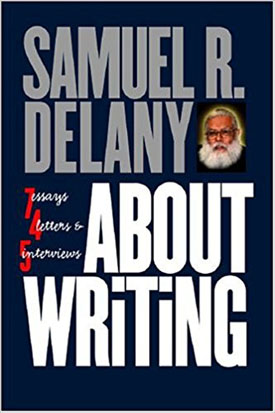 A bit of history: I don’t really remember when I started reading Samuel R. Delany’s novels. Looking at the list of his works, I seem to have pretty much kept up with everything through the mid-eighties, which is roughly the time that I quit reading for several years (I guess you need a break from just about anything, from time to time). I liked his novels: they were “good,” which at that point was the most precise description I had available. (Now that term falls somewhere between describing my evaluation of literary quality and my gut response as a reader.) Then Dhalgren happened, which led me to understand that there was much more going on in these books than I had bothered to think about.
A bit of history: I don’t really remember when I started reading Samuel R. Delany’s novels. Looking at the list of his works, I seem to have pretty much kept up with everything through the mid-eighties, which is roughly the time that I quit reading for several years (I guess you need a break from just about anything, from time to time). I liked his novels: they were “good,” which at that point was the most precise description I had available. (Now that term falls somewhere between describing my evaluation of literary quality and my gut response as a reader.) Then Dhalgren happened, which led me to understand that there was much more going on in these books than I had bothered to think about.
That Delany is a heavyweight is no longer a question. He may even be “great,” at least within the bounds of those areas he’s chosen to work in. It’s hard to make that evaluation with your face right in it. His fiction is often — or perhaps more accurately, “usually” — unsettling, but in a good way.
His nonfiction, at least in the case of About Writing, is tremendously exciting for anyone who appreciates the experience of being a reader. This is both because he is a fluent writer and because he expresses exciting ideas clearly and economically. (These are not always the same thing.)
The exciting part revolves around something directly related to the idea of becoming a sophisticated reader (and these essays — in fact, the whole book — are concerned very seriously with reading). This is one of those books that has neatly provided a context and a vocabulary for concepts that I had been groping toward on my own. As an illustration of this process, the essays in particular crystallized why I had been increasingly dissatisfied with the sort of “standard critique questions” that seem to be an intrinsic part of writers’ groups: they are largely beside the point and deal mainly with the mechanics of writing, not the issues of writing. Delany takes the mechanics and kicks the whole idea up an order of magnitude, coming much closer to the way, I think, a writer works and the way a reader reads. He emphasizes the creation of narrative structures under which all questions of plot, character, and setting are subsumed, and hits the idea of language as a writer’s tool with commentaries on the way language can be manipulated to carry subtext and the unspoken dimensions that bring a text to life. His emphasis on clarity and brevity — the compression of information into the smallest intelligible space — is reflected in his own prose, which is fairly dense but never obscure.
It’s about text. Delany brings the tools and vocabulary of criticism into the service of writing, which, after a decade or two of watching artists of every stripe bring the making of art into the service of criticism, is a welcome change. It is this textual approach that I found most exciting and most enlightening, as a writer, a reviewer and as a reader. He treats the writer’s product, the text, as a whole, which is the way, as seems self-evident when one stops to think about it, that a writer is most likely to approach it until taught otherwise.
While the essays are certainly detailed enough, filled with examples and references, the letters somehow seem more specific — perhaps just that they are not as wide-ranging (and the essays are conversational enough that the letters don’t seem much more personal). Of the interviews, the least interesting is the lengthy and fairly academic
That’s only a minor flaw in an otherwise engaging set of writings. I think for anyone interested in a issues of writing, or for that matter the whys and wherefores of the process of reading, this one is a must.
(Wesleyan University Press, 2005)
